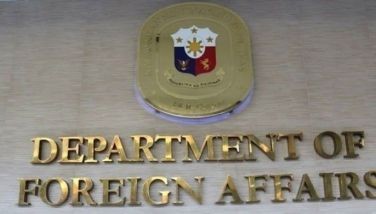Japanese firms ask Koizumi to lift new hiring restrictions

December 20, 2004 | 12:00am
FUKUOKA CITY, Japan —A group of Japanese recruiters of foreign entertainers has asked the Tokyo government to revoke a new immigration law drastically reducing the number of Filipino overseas performing artists (OPA) allowed to work in Japan.
The 760-strong Rengokai, the association of all Japanese promoters recruiting foreign entertainers, will formally seek audience with Japanese Prime Minister Junichiro Koizumi to explain the very serious implications of the new law on the economies of both the Philippines and Japan, said Ryoichi Tsugawa, the group’s vice president.
Tsugawa estimated that as much as $2.4 billion of economic activities would be adversely affected if the new Japanese immigration law would be implemented next month.
More than 95 percent of Filipino OPAs would lose their jobs when their number is cut down from 80,000 to 6,000, and that it would create more unemployment and other socio-economic losses in the Philippines and Japan, he added.
Tsugawa, president of the Fukuoka-based Starqueen Co. Ltd., said the new immigration law was an apparent reaction by the Japanese government to pressure from US government, which had accused Japan of being a major source of human trafficking, especially women lured into prostitution.
Filipino OPAs should not be labeled as "Japayukis" as they are modern-day heroes of the Philippines for their major contributions to the country’s economy, he added.
Tsugawa said the Philippines in particular would lose foreign exchange remittances from OPAs who earn an average of 100,000 yen or $950 a month for a standard six-month contract.
The Rengokai fears that the economic losses would not only displace the OPAs, but also affect airlines and banks where they remit money, as well as the Philippine government in terms of taxes and the OPAs’ non-tax revenue contributions, he added.
Tsugawa thanked President Arroyo for taking up the cause of the OPAs and expressed his wish that Koizumi would reciprocate a similar concern for the OPAs.
Tsugawa met yesterday with Philippine Consul General Antonio Villamayor after learning that Mrs. Arroyo had stepped in to look into the problem following protest actions in Metro Manila by OPAs and the Confederated Association of Licensed Entertainment Agencies (CALEA) — Rengokai’s Philippine counterpart.
Rengokai toured reporters to Japanese nightclubs where male and female Filipino OPAs work as professional singers and dancers, entertaining Japanese customers.
The 760-strong Rengokai, the association of all Japanese promoters recruiting foreign entertainers, will formally seek audience with Japanese Prime Minister Junichiro Koizumi to explain the very serious implications of the new law on the economies of both the Philippines and Japan, said Ryoichi Tsugawa, the group’s vice president.
Tsugawa estimated that as much as $2.4 billion of economic activities would be adversely affected if the new Japanese immigration law would be implemented next month.
More than 95 percent of Filipino OPAs would lose their jobs when their number is cut down from 80,000 to 6,000, and that it would create more unemployment and other socio-economic losses in the Philippines and Japan, he added.
Tsugawa, president of the Fukuoka-based Starqueen Co. Ltd., said the new immigration law was an apparent reaction by the Japanese government to pressure from US government, which had accused Japan of being a major source of human trafficking, especially women lured into prostitution.
Filipino OPAs should not be labeled as "Japayukis" as they are modern-day heroes of the Philippines for their major contributions to the country’s economy, he added.
Tsugawa said the Philippines in particular would lose foreign exchange remittances from OPAs who earn an average of 100,000 yen or $950 a month for a standard six-month contract.
The Rengokai fears that the economic losses would not only displace the OPAs, but also affect airlines and banks where they remit money, as well as the Philippine government in terms of taxes and the OPAs’ non-tax revenue contributions, he added.
Tsugawa thanked President Arroyo for taking up the cause of the OPAs and expressed his wish that Koizumi would reciprocate a similar concern for the OPAs.
Tsugawa met yesterday with Philippine Consul General Antonio Villamayor after learning that Mrs. Arroyo had stepped in to look into the problem following protest actions in Metro Manila by OPAs and the Confederated Association of Licensed Entertainment Agencies (CALEA) — Rengokai’s Philippine counterpart.
Rengokai toured reporters to Japanese nightclubs where male and female Filipino OPAs work as professional singers and dancers, entertaining Japanese customers.
BrandSpace Articles
<
>
- Latest
- Trending
Trending
Latest
Trending
Latest
Recommended































